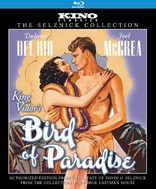Bird of Paradise Blu-ray Movie
HomeBird of Paradise Blu-ray Movie 
Kino Lorber | 1932 | 80 min | Not rated | May 01, 2012Movie rating
6.6 | / 10 |
Blu-ray rating
| Users | 3.2 | |
| Reviewer | 3.0 | |
| Overall | 3.0 |
Overview
Bird of Paradise (1932)
A young man falls overboard and is saved by a beautiful Polynesian girl. They fall in love, but their idyll is smashed when the local volcano begins to erupt. The man discovers that the local custom is to sacrifice a young woman to the volcanic gods. They try to escape but realize that "east is east and west is west, and never the twain shall meet."
Starring: Dolores del Rio, Joel McCrea, John Halliday, Richard 'Skeets' Gallagher, Bert RoachDirector: King Vidor
| Romance | Uncertain |
| Drama | Uncertain |
| Adventure | Uncertain |
Specifications
Video
Video codec: MPEG-4 AVC
Video resolution: 1080p
Aspect ratio: 1.34:1
Original aspect ratio: 1.37:1
Audio
English: LPCM 2.0
Subtitles
None
Discs
25GB Blu-ray Disc
Single disc (1 BD)
Playback
Region A, B (C untested)
Review
Rating summary
| Movie | 3.0 | |
| Video | 3.5 | |
| Audio | 2.5 | |
| Extras | 0.5 | |
| Overall | 3.0 |
Bird of Paradise Blu-ray Movie Review
"East is East and West is West and never the twain shall meet."
Reviewed by Casey Broadwater May 4, 2012The civilized character "going native" is one of the oldest tropes of the adventure/capital-R-Romance film genre, and the way it's been implemented has changed drastically over time along with our shifting cultural attitudes towards race. A common theme in movies made after the 1960s or so--due to some much-needed historical revisionism--is "white guilt" about the ill-treatment of indigenous peoples. It shows up in many films, but the most famous examples are probably Avatar and Dances with Wolves. In the case of both, the white male lead learns the way of the "noble savage" and inevitably turns on his own so-called civilized culture, which is alienating and responsible for most of the real savagery. Note, though, that the white guy is still the hero, and usually portrayed as being a better native than the natives themselves. Even today, there's a subtle form of racism at work, with the film industry seemingly dead-set on the idea that predominately white American audiences won't be attracted to non- white protagonists. (Will Smith excepted.) In the early part of the 20th century, however, films about white men "going native" were far less self- aware of their racial implications. And while some may seem offensive now, its mostly in quaint and almost innocent ways.
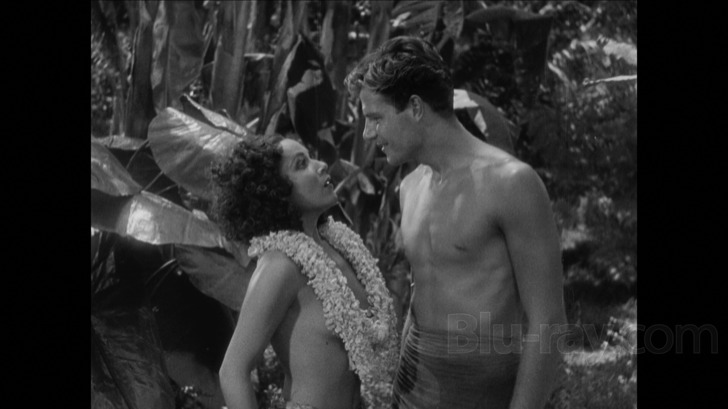
Take Bird of Paradise, the 1932 film produced by David O. Selznick and directed by King Vidor, one of the most prolific filmmakers of cinema's first five decades. Where many of Vidor's previous films--like The Crowd and The Big Parade--boasted a humanistic slant, a social realism that empathized with common people, Bird of Paradise is atypical, an epic wish-fulfillment romance of the sort where the wealthy white hero strides ashore on a distant heathen land and basically takes ownership of all he surveys, including the tribal chieftain's supple, willing daughter, local taboos be damned. The Pacific islanders in the film are portrayed as trinket-happy savages with kooky superstitions, but at the same time, we're meant to be envious of their "simple" lifestyle, devoid of all the anxieties and stresses of Depression-era America. Like a less sophisticated version of F.W. Murnau's Tabu, which was made the previous year, and like 1935's Mutiny on the Bounty, Bird of Paradise presents Polynesia as an alluring, unspoiled Eden. Of course, all paradises in the Western canon are eventually "lost," so we're pretty much assured a tragic ending from the start.
The story concerns Johnny (Joel McCrea), a handsome young yachtsman casually sailing around the South Pacific with a gang of presumably well-to-do crew mates. (I mean, come on, they've even got an implied-gay butler to serve them drinks and take care of all the fancy clothes they've brought along.) When Johnny is accidentally pulled overboard, he's rescued by the princess Luana (Dolores del Rio), who later entices him--in a semi- controversial display of pre-Hays Code nudity--by swimming naked around the ship after dark. Unable to resist her exotic wiles, Johnny dives in after her, chases her up onto the beach, and wrestles her to the sand, where she struggles but ultimately gives in to his kisses. It's a bit rape-y, but here's the thing--she likes being pinned down. And she likes Johnny, who tells his friends to leave him on the island until they swing back around in a few weeks' time. There are only two complications: 1.) Luana is pledged to the chief of a neighboring island, and 2.) if the local volcano starts to smoke, she's expected to sacrifice herself for the good of her people.
After Joe Versus the Volcano, the whole jump in the bubbling crater to appease the gods storyline is hard to take seriously, but put yourself in the seat of an early 1930s audience member, keen for some romantic escapism. For it's time, Bird of Paradise offered plenty of adventure and big-budget spectacle. There are native dance scenes choreographed by a then-unknown Bubsy Berkeley, moody underwater cinematography, and some great stunts, like McCrea jumping off a cliff onto a palm tree and sliding down a steep hill on a leaf. At one point, he even boogie boards on the back of a sea turtle. And then there's the sway-in-the-breeze score by pioneering film composer Max Steiner, which drifts along on South Seas melodies, plinked out on ukuleles and vibraphones.
What sells the film, though, is the romance between McCrea--a hunk later to star in Sullivan's Travels--and the wide-eyed Mexican beauty icon Dolores del Rio, whose nearly bare breasts are covered only by strategically placed flower leis. She's meant to be the embodiment of eroticism unrestrained by Western societal mores, and though it's never outright depicted, the promise of sex is strongly suggested in most of her scenes. There's some subversively racy stuff here, like a shot of coconut milk dribbling down Luana's chin that has to be more than a merely coincidental innuendo. The way Luana talks in babyish, vaguely Polynesian gibberish is both mildly sexist and racist--and I hope I never have to see another film where two lovers teach one another their respective language's word for "kiss"--but if you can hold back your cultural cringe toward some of the film's outdated attitudes and narrative cliches, Bird of Paradise still has its moments of swoon-worthy charm.
Bird of Paradise Blu-ray Movie, Video Quality 
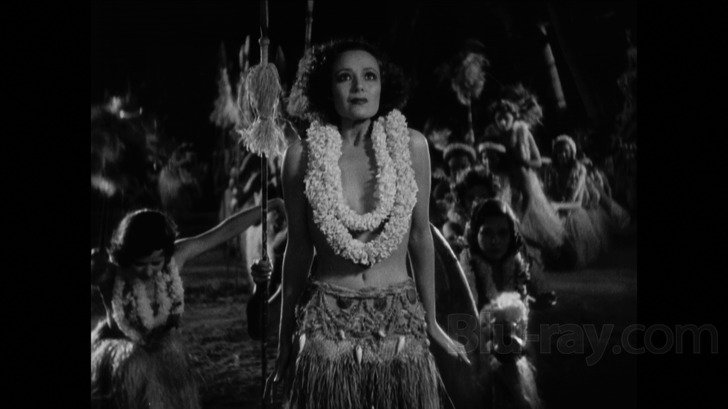
Like most titles in the public domain, Bird of Paradise has been subject to some underwhelming home video releases in the past, so it's great to see that Kino Classics has given the film such a wonderful Blu-ray presentation. The disc's 1080p/AVC-encoded transfer has been newly mastered from an original nitrate 35mm print that was preserved by the George Eastman House Motion Picture Department. Note, though, that I used preserved and not restored. There's been little-to-no digital clean-up of the 80-year-old print, but I'm fine with this hands-off approach. The minor specks and scratches you'll see here are rarely--if ever--distracting, and the image is reproduced faithfully, with no texture-robbing noise reduction or halo-inducing edge enhancement. The picture is plenty sharp on its own, with appreciable fine detail in close-ups and an overall level of clarity that easily bests prior standard definition editions. Just as importantly, the film's monochromatic gradation has been treated carefully; blacks are deep without crushing too much shadow detail, white are bright but not overblown, and there's a rich spectrum of grays in between. Finally, I didn't spot any overt compression issues--the film sits with room to spare on a single-layer, 25 GB disc. Another strong Kino Classics transfer.
Bird of Paradise Blu-ray Movie, Audio Quality 
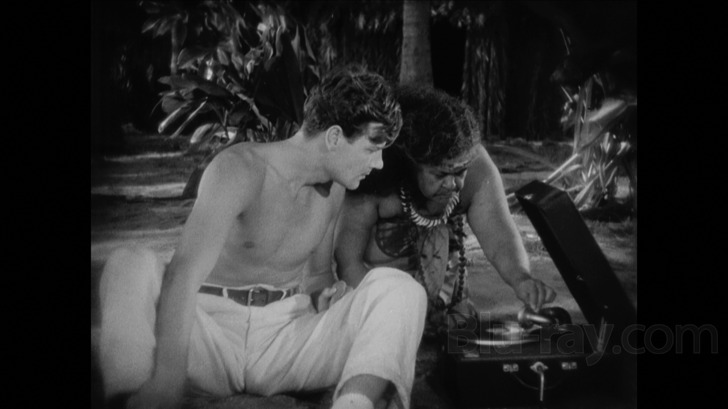
Bird of Paradise is sometimes claimed to be the first talkie with a full-length film score, and while that's not exactly true, Max Steiner's lulling, Polynesia-influenced score is memorable, blending traditional orchestration with some distinctly South Pacific motifs and instrumentation. Steiner, the "father of film music," would go on to compose for King Kong, Gone with the Wind, and Casablanca--among some 300 others--so it's fascinating to hear one of his earliest efforts. By way of the Blu-ray's LPCM 2.0 mono track, the music sounds quite crackly and brittle, as you'd expect from an 80-year-old film, but there are moments where it's noticeably peaky and overly brash. Likewise, dialogue is sometimes a hair low in the mix, and slightly muffled on occasion, though I never had any real trouble understanding what was being said. Unfortunately for those who might need subtitles, however, none are supplied. I'm assuming Kino did what they could to get the original audio in listenable shape, but don't expect high fidelity from this mix.
Bird of Paradise Blu-ray Movie, Special Features and Extras 
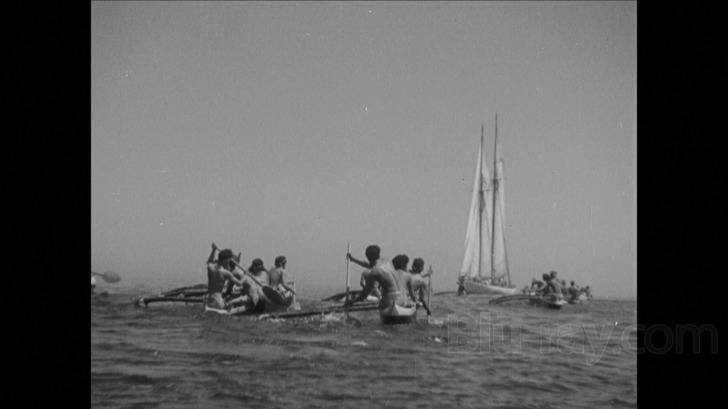
The only extras on the disc are high definition trailers for Pandora and the Flying Dutchman, Nothing's Sacred, and A Star is Born.
Bird of Paradise Blu-ray Movie, Overall Score and Recommendation 
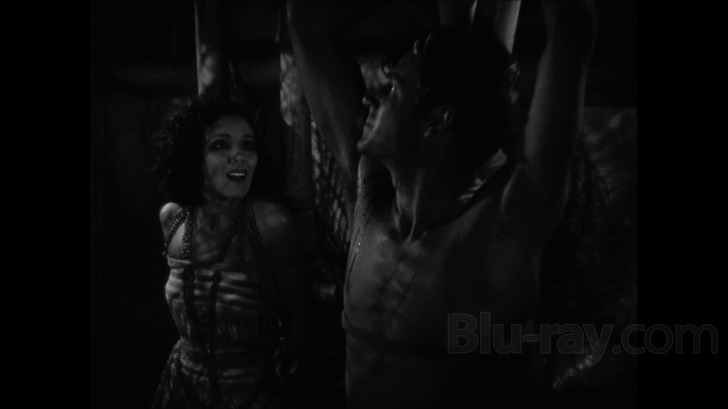
Although King Vidor's Bird of Paradise is hokey and understandably outdated when it comes to racial and gender attitudes, it's also a prime example of the sort of lush, sweeping romance that Hollywood did so well in the 1930s. (Steer clear of the unnecessary 1951 remake, starring Debra Paget.) The film looks great on Blu-ray, especially after years languishing in the public domain, but the disc is unfortunately short of value-extending extras. Still, it's worth a purchase for those collecting Kino Classics' David O. Selznick series. There are precious few studios and distributors regularly putting out films from the 1920s and '30s, so it's good to show Kino your support!
Similar titles
Similar titles you might also like

The Hurricane
1937

The Garden of Allah
1936

Fanny
1961

The Blue Lagoon
Limited Edition to 3000 - SOLD OUT
1980

The Choice
2016

Dodsworth
Warner Archive Collection
1936

Kitty Foyle
1940

Brooklyn
2015

Imitation of Life
1934

Krakatoa: East of Java
1969

Miss Annie Rooney
1942

Return to the Blue Lagoon
1991

Amelia
2009

Ship of Fools
1965

Pandora and the Flying Dutchman
1951

The Sheik
Paramount Presents #25
1921

W.E.
2011

Hawaii
1966

The Miracle Woman
1931

Darling
1965
